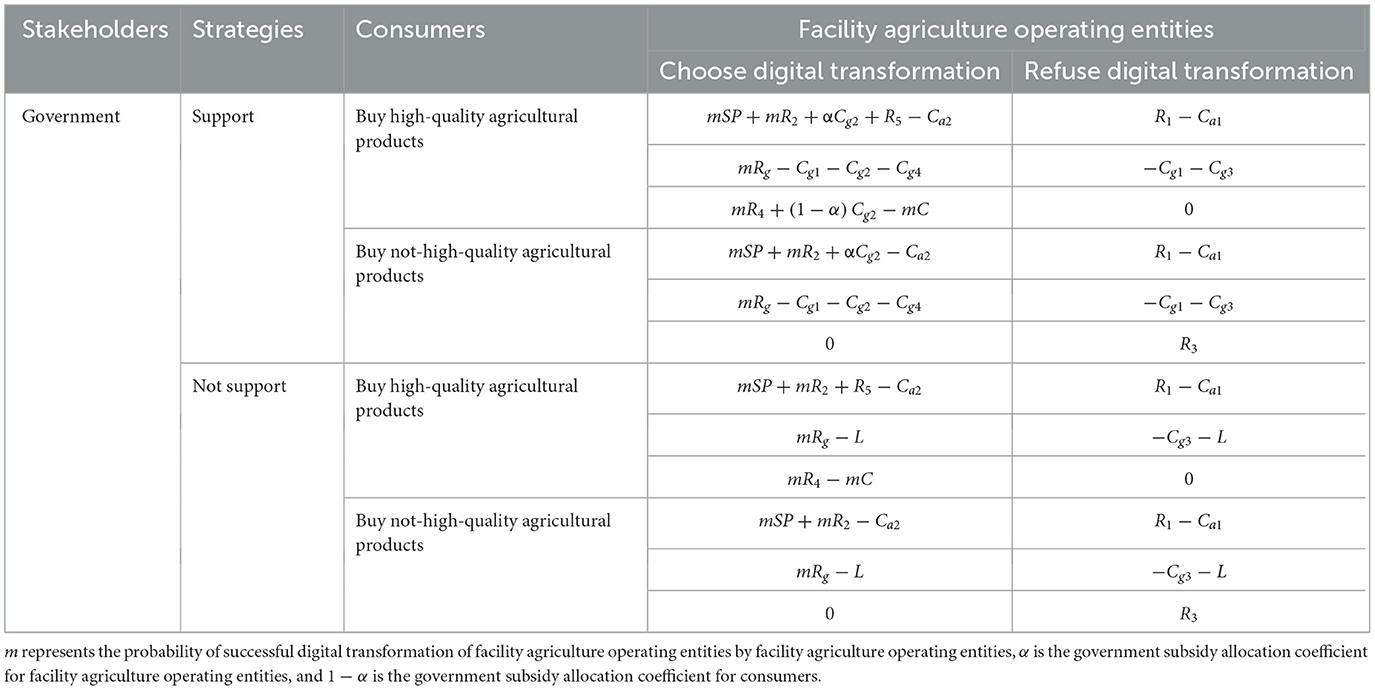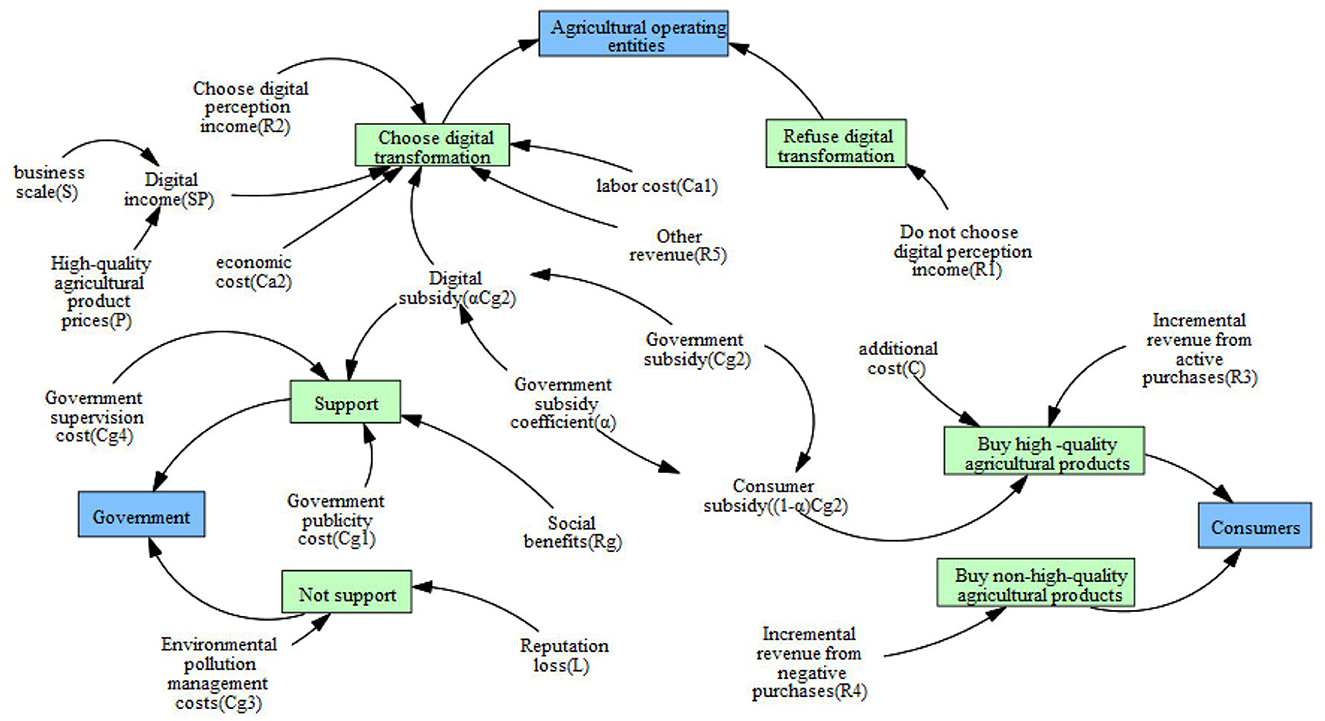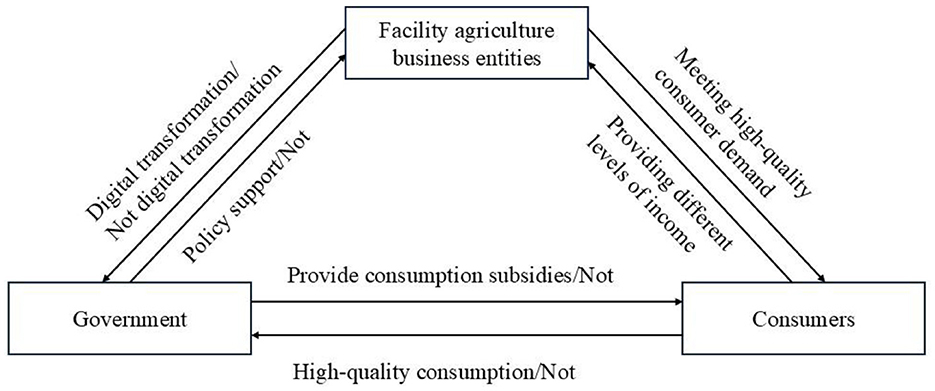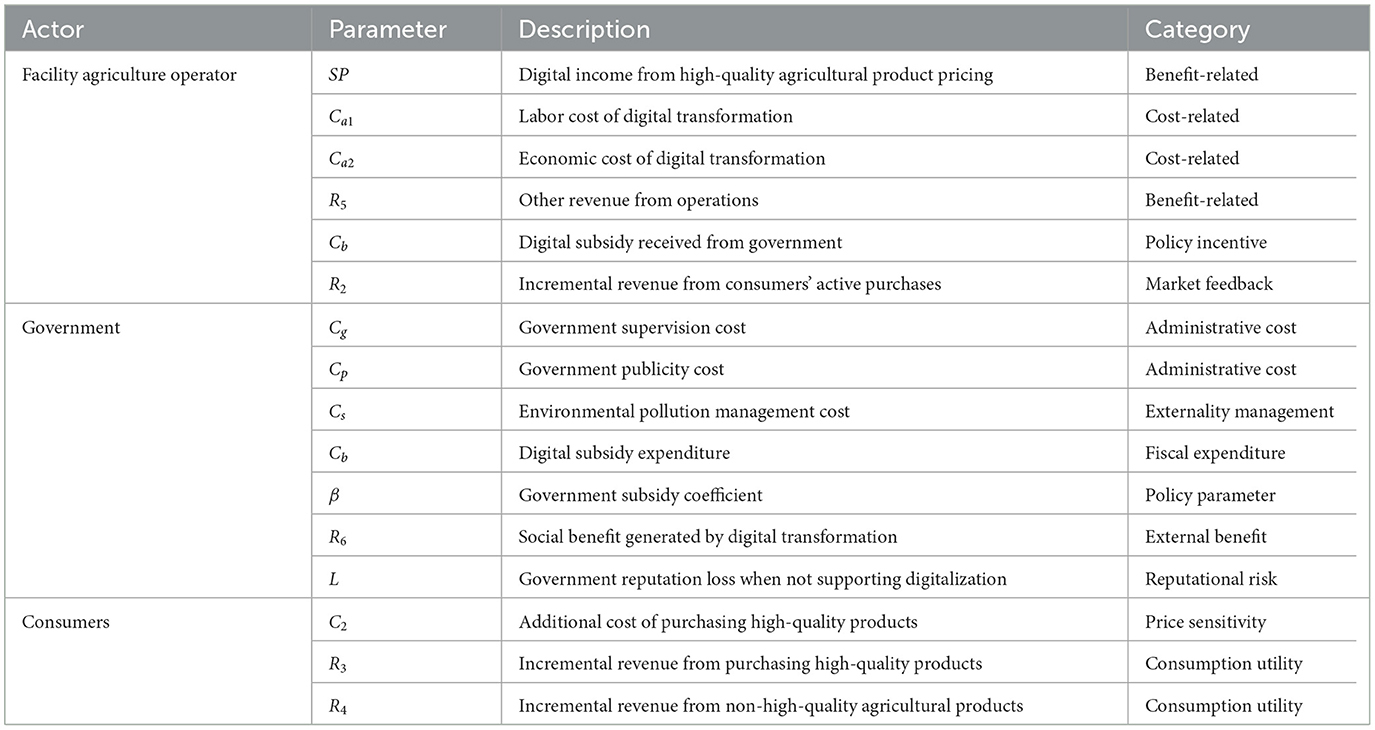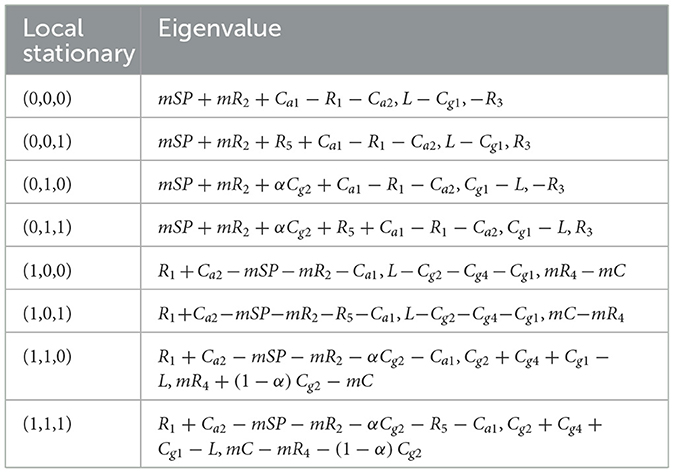- 1Business School, Wenzhou University, Wenzhou, China
- 2Student Affairs Department, Zhejiang College of Security Technology, Wenzhou, China
Introduction: Facility agriculture, as an important part of modern agriculture, is transforming from a traditional model to a digital and intelligent model.
Methods: In order to accelerate the development of facility agriculture, this paper constructs a three-party evolutionary game model of facility agriculture operating entities, government and consumers based on evolutionary game theory, and simulates and analyzes the influencing factors of the digital transformation of facility agriculture.
Results: The results show that there is an optimal threshold for government subsidies. Exceeding this threshold will bring a heavy burden to the government's finances, and the subsidy policy is difficult to sustain; government propaganda plays a significant role in promoting facility agriculture operating entities to choose facility agriculture digitalization, but excessive propaganda will also increase the fiscal burden and reduce the enthusiasm of government propaganda; the higher the digital literacy of facility agriculture operating entities, the more inclined they are to digital transformation; in the absence of government subsidies, facility agriculture operating entities need to have higher digital literacy to cope with the risks and challenges in the transformation process.
Discussion: This study provides theoretical guidance for facility agriculture operating entities to make scientific decisions and provides policy references for the government to develop facility agriculture.
1 Introduction
Facility agriculture is supported by science and technology and market-oriented. It represents the development direction of modern agriculture, and its development level is one of the important indicators of the level of agricultural modernization (Zhi-xin and Yun-hua, 2020). As an important part of modern agriculture, facility agriculture has become a key force in promoting agricultural modernization and sustainable development with its high efficiency, intensiveness and controllability. It plays an important role in farmers' income, agricultural productivity and upgrading of agricultural industrial structure. Compared with traditional agriculture, facility agriculture overcomes the problems of traditional agriculture's dependence on weather and poor resistance to natural disasters. However, traditional facility agriculture requires a lot of capital and equipment (Huimin et al., 2020), including land leasing, greenhouse construction, equipment purchase, technology introduction, etc. (Jian, 2024), and daily maintenance and management also require a lot of labor. It has gradually become difficult to adapt to the needs of modern society for environmental protection and smart agriculture. It is necessary to rely on modern technology to provide a more suitable environment for agricultural production and realize the standardization and precision of Camanzi et al. (2020). Digital transformation has become an inevitable trend in the development of facility agriculture (Shuzhong et al., 2022).
In recent years, the Chinese government has attached great importance to the development of facility agriculture. The report of the 20th National Congress of the Communist Party of China clearly proposed to establish a big food concept, develop facility agriculture, and build a diversified food supply system. The Central Document No. 1 also mentioned the need to develop facility agriculture many times. In June 2023, the Ministry of Agriculture and Rural Affairs, the National Development and Reform Commission, the Ministry of Finance and the Ministry of Natural Resources jointly issued the “National Modern Facility Agriculture Construction Plan (2023-2030).” The plan proposed to optimize the layout of modern facility agriculture, appropriately expand the scale, and upgrade and transform old facilities. This is also China's first modern facility agriculture construction plan. Among them, the digital transformation of facility agriculture is an important aspect of the development of facility agriculture. The “National Modern Facility Agriculture Construction Plan (2023-2030)” emphasizes the comprehensive improvement of agricultural digital greenhouse construction, and through the application of digital technology to carry out all-round and in-depth transformation, realize the intelligentization, informatization, and precision of agricultural production, improve agricultural production efficiency, reduce production costs, optimize resource allocation, improve the quality of agricultural products, and meet consumers' demand for high-quality agricultural products (Wei-ping et al., 2024). At the same time, the Chinese government encourages and guides various entities to participate in the construction of modern facility agriculture, provides moderate subsidies for facility agriculture procurement, and many financial institutions also provide financial support for the development of facility agriculture.
China's facility agriculture has developed rapidly (Li et al., 2024), the scale has continued to expand, and the technical level of facility agriculture has significantly improved (Chen et al., 2024). In 2021, the country's facility planting area will reach about 40 million acres, of which 80% of the facility vegetable area ranks first in the world. As of 2023, more than 70% of China's facility agriculture is operated by small farmers (Yi and Jinjiang, 2024), the mechanization rate of facility planting exceeds 42%, the water efficiency of high-efficiency facility planting is more than 50% higher than that of field, and the use of pesticides and fertilizers is relatively reduced by 30% and above 20%.1 However, there is still a large gap compared with Western developed countries. Among them, the Netherlands and Israel have relatively developed facility agriculture (Shirong et al., 2012). The Netherlands mainly uses glass greenhouses, and its facility agriculture widely uses advanced glass greenhouses, plant factories, etc. In addition, the Netherlands has also explored vertical agriculture to efficiently utilize land, pesticides and water resources. However, due to carbon footprint issues, environmental issues. The conservation perspective has not been further promoted (Blom et al., 2022; Chappin et al., 2024). Israel, known as the “Kitchen of Europe,” has developed desert greenhouses suitable for desert areas, built an oasis in the desert, and produced high-quality flowers to meet domestic demand and export them abroad (Liu, 2015). Developed countries have achieved large-scale and intensive development of facility agriculture by introducing policy support and integrating relevant resources (Lubberhuizen, 2024). They have carried out various innovative activities, prioritized scientific and technological progress in important positions, and promoted smart agriculture using the Internet of Things (Yamashita et al., 2024), promoting the development and commercialization of agricultural technologies (Lassoued et al., 2023).
Digital transformation is an important way to achieve high-quality development of facility agriculture (Saleem et al., 2021). Although China's facility agriculture area currently ranks first in the world, modern facility agriculture still has problems such as insufficient resource utilization, low marketization, scattered factors, low integration (Peng-bo et al., 2024; Xudong et al., 2020). Through digital transformation , modern information technology can be deeply applied to monitor and accurately control relevant parameters in the facility, such as temperature, humidity, and carbon dioxide concentration, to achieve scientific management, and the trend of “technical integration” is obvious (Zhen and Xueyu, 2015). In addition, facility agriculture operating entities can use big data to explore the potential value of agricultural production data (Junhu et al., 2020), provide a more scientific basis for planting, predict crop growth cycles and market demand, and timely adjust planting structures and sales strategies to reduce operating risks. In addition, digital transformation has also promoted the integration of facility agriculture with other industries. Facility agriculture operating entities continue to build new paths for collaborative innovation (Jiabin et al., 2021), especially in combination with tourism and e-commerce, which has promoted the integration of rural industries and promoted the diversification and overall prosperity of the rural economy (Xue et al., 2023). Through the joint efforts and support of all sectors of society, digital transformation will lead facility agriculture to develop in a higher quality and more sustainable direction, and contribute to the realization of agricultural modernization (Lee et al., 2023; Wei-jiang and Bing-qi, 2024).
In reality, facility agriculture is an integrated system composed of multiple factors such as technology, capital, land, and management. Realizing the digital transformation of facility agriculture is a complex project, covering multiple links of production, transportation and sales, involving multiple subjects such as enterprises, facility agriculture operating entities, and governments. Therefore, this paper uses evolutionary game theory, takes the digitalization of facility agriculture as the main line, selects facility agriculture operating entities, governments, and consumers as representative participants, and expounds on the issue of facility agriculture digitalization, providing theoretical reference for the development of facility agriculture under the background of digitalization. Compared with existing studies, the marginal contribution of this paper is: on the one hand, using evolutionary game theory, the facility agriculture operating entities, governments, and consumers are included in the same system, the key influencing factors of facility agriculture digitalization are analyzed, and the practical significance behind facility agriculture digitalization is explored; on the other hand, based on the perspective of dynamic evolution, the key influencing factors are simulated and analyzed to improve the scientificity of the decision-making of facility agriculture operating entities in the future digital transformation of facility agriculture.
The rest of this paper is structured as follows: Section 2 introduces the theoretical basis of this paper, including model assumptions and the selection of key parameters. Section 3 constructs a three-party game model among the government, facility agriculture operating entities, and consumers, and analyzes the dynamic system stability of the model. Section 4 discusses the results of the simulation. Section 5 summarizes the main research conclusions of this paper and puts forward relevant policy recommendations based on them.
2 Theoretical analysis
2.1 Evolutionary game theory
Recent studies have enriched the application of evolutionary game theory in understanding how commitment, incentives, and enforcement mechanisms promote cooperation and agreement compliance. For example, Sasaki et al. (2015) studied peer punishment as an endogenous mechanism for sustaining cooperation in commitment games. More recently, Ogbo et al. (2022) extended this to multiplayer settings, emphasizing the role of prior commitments in coordination dynamics. Similarly, Barrett (2016) explored how international environmental cooperation can be sustained through voluntary vs. enforced mechanisms, shedding light on the interplay between policy enforcement and self-motivated compliance.
These contributions offer valuable insights into the role of contractual and incentive-based frameworks in promoting cooperation, and they provide theoretical underpinnings that are highly relevant to our model. Specifically, we draw on these works to design and interpret the strategic interactions between facility agriculture operators, the government, and consumers, where digital transformation is seen as a cooperative endeavor requiring multi-party alignment and credible policy support.
Recent advances in stochastic evolutionary game modeling have extended its application to a wide range of three-agent interaction scenarios, offering valuable reference points for our research. For instance, Encarnação et al. (2016) investigated the dynamic cooperation between the state, business, and civil society in environmental monitoring, highlighting how cross-sectoral collaboration emerges through paradigm shifts. Similarly, Alalawi and Zeng (2020) examined public-private interactions in healthcare provision, showing how government investment incentives and patient choices co-evolve. In the domain of safe technology regulation, recent studies such as “Both eyes open” and “Media and responsible AI governance” have illustrated the critical role of vigilant incentives and media oversight in shaping actor behavior in AI safety frameworks (Bova and Di Stefano, 2024; Balabanova et al., 2025). From an energy policy perspective, Liu et al. (2021) explored the strategic responses of private firms in public-private partnerships for green energy, emphasizing the role of institutional trust and government commitment.
These studies enrich our understanding of how multi-party evolutionary games operate in real-world governance settings. Drawing on these insights, our model of facility agriculture digitalization is positioned within a similar triadic structure—comprising government, business, and consumers—facing coordination challenges under policy, economic, and behavioral uncertainty.
2.2 Theoretical framework
Based on the interactive relationship between the three parties of facility agriculture operating entities, government and consumers, the following hypothesis is proposed:
Hypothesis 1: The game players are the government, the operator of facility agriculture and consumers. The government, the operator of facility agriculture and consumers are limited rational economic persons, and the three parties play games under incomplete information.
Hypothesis 2: The strategy set of the facility agriculture operator is (transformation, no transformation). Among them, the probability of the facility agriculture operator choosing transformation is x, and the probability of not transforming is 1–x. In the process of digital transformation of facility agriculture, the digital greenhouse will improve the output and quality of the facility agriculture operator's products and obtain additional benefits. The benefits SP are related (Zhongming et al., 2011). While increasing the benefits, it reduces the labor costs Ca1. However, the introduction of facilities requires a certain economic cost Ca2, including the maintenance cost of the digital greenhouse. In the process of digital transformation, the facility agriculture operator will receive help from the government and obtain financial subsidies from the government αCg2. In addition, when the digital literacy of the facility agriculture operator is high, choosing a digital greenhouse will reduce the perceived risk (Kahneman and Tversky, 2013) and increase the perceived benefits R2(including market share, social recognition, personal sense of accomplishment, etc.). The perceived benefits of not choosing digital transformation are R1.
Hypothesis 3: The government's strategy set is (support, not support). Among them, the probability that the government supports the digital transformation of facility agriculture operating entities is y, and the probability of not supporting is 1–y. For the sake of agricultural construction, the government encourages and supports facility agriculture operating entities to build agricultural digital greenhouses, publicizes and promotes digital transformation, incurs publicity costs Cg1, and requires manpower and time to supervise the publicity effect Cg4. When facility agriculture operating entities choose facility agriculture digital transformation, the government will also give appropriate financial subsidies, incurring subsidy costs Cg2. Facility agriculture operating entities can make up for the government's absence in the digital transformation process, promote agricultural digital transformation, enhance the government's political and social reputation, and the government can obtain social benefits Rg. On the contrary, if the government chooses not to support the strategy, it will need to bear the consequences of traditional facilities damaging the environment, pay for environmental pollution control costs Cg3, and lose reputation due to the decline in government credibility L (McConnell and Hart, 2019).
Hypothesis 4: The strategy set of consumers is (buy high-quality agricultural products, buy non-high-quality agricultural products). Among them, the probability of consumers buying high-quality agricultural products is z, and the probability of buying non-high-quality agricultural products is 1–z. Consumers actively purchase high-quality agricultural products from digital greenhouses and support the digital transformation of facility agriculture operating entities. They need to pay additional costs C, bring incremental benefits from actively purchasing high-quality agricultural products R3, and obtain government subsidies (1−α)Cg2. Consumers are satisfied with the quality of agricultural products and have a strong willingness to consume. They increase their trust in agricultural products and enable facility agriculture operating entities to obtain other benefits R5. If consumers have doubts about the quality of agricultural products in digital greenhouses, are unwilling to take risks, and have a weak willingness to purchase agricultural products in digital greenhouses, then the consumer's benefit is R4.
Based on the above assumptions, the game model payoff matrix is constructed as shown in Table 1, and the definitions and relationships of the variables are shown in Figure 1.
The digital transformation of facility agriculture will bring a series of advantages such as improved production efficiency, increased product quantity, and improved product quality. It will help facility agriculture operators stand out in the fierce market competition, improve market competitiveness, gain more market share, and obtain more benefits. In addition, government subsidies have also alleviated the cost pressure of facility agriculture operating entities to a certain extent. When consumers make consumption decisions, they usually analyze the cost-benefit after consumption. When the expected incremental benefits are greater than the costs to be paid, consumers will consume. Therefore, this article assumes that the benefits generated by the digital transformation of facility agriculture operating entities are greater than the costs to be paid, and the incremental benefits of consumers R4are greater than the costs paid C.
Taking into account the influence, controllability, and importance of each parameter in the model on the equilibrium of the game model, this paper selects three parameters: government subsidies, government publicity, and digital literacy of facility agriculture operating entities for simulation analysis. First of all, government subsidies are of great significance to the digitalization of facility agriculture, and are one of the important means to promote agricultural modernization and promote rural revitalization (Qing et al., 2023). Through the implementation of government subsidy policies, the process of digitalization of facility agriculture can be accelerated, agricultural production efficiency and product quality can be improved, the income of facility agriculture operating entities can be increased, and the level of rural governance can be improved. Government subsidies play a vital role in the digital infrastructure of facility agriculture. Subsidy funds can be used to purchase advanced agricultural equipment, such as smart greenhouses, automated irrigation systems, etc. (Heyl et al., 2022).
Government publicity is an important part of promoting the participation of governments at all levels, enterprises and agricultural operators in the digital transformation of facility agriculture. It has increased the popularity of facility agriculture and strengthened its importance. By widely publicizing the achievements and advantages of digitalization of facility agriculture, it can increase the confidence and support of agricultural operators in facility agriculture, help to form a good agricultural atmosphere, make agricultural operators realize the importance of facility agriculture, provide a solid social foundation for the digitalization of facility agriculture, and promote the transformation of agricultural modernization (Jiangyi and Fan, 2022).
The digital literacy of facility agriculture operating entities has a multifaceted impact on the digitalization of facility agriculture. When operators have high digital literacy, they can accept and master new technologies faster and better, and realize functions such as precision planting and pest and disease warning in facility agriculture. Through the digitalization of facility agriculture, it can also help facility agriculture operating entities improve production efficiency and crop quality and reduce production costs. At present, most facility agriculture operating entities lack agricultural expertise, especially digital agriculture knowledge, and lack relevant skills training, resulting in low digital literacy and low ability to use digital technology (Yang et al., 2023).
In general, in the process of digital transformation of facility agriculture, the government, facility agriculture operating entities and consumers have different cooperation scenarios based on their respective interests. Therefore, the construction of the three-party game interaction relationship is shown in Figure 2 below. In addition, there is a cooperative relationship among the three of them, and a sustainable agricultural supply system has been constructed through synergistic cooperation: facility agriculture operating entities act as core producers, relying on modern digital technologies such as smart greenhouses and soilless cultivation to achieve high efficiency output. The government reduces the investment risk of facility agriculture operating entities and ensures product quality and safety by formulating subsidy policies and regulatory systems. Consumers will form a demand-side pull by purchasing green certified agricultural products, and their consumption data feedback will further guide production optimization. Through the closed-loop mechanism of “policy guidance—technology empowerment—market response,” the three parties jointly promote the digital transformation of facility agriculture, forming a win-win ecology for all three parties (Sasaki et al., 2015; Barrett, 2016; Ogbo et al., 2022).
To improve the interpretability of the model and clarify the function of each parameter, we categorize them based on the role of the three core actors (agricultural operating entities, government, and consumers) and their respective economic and policy-related dimensions (see Table 2). This classification helps to better understand the structure of incentives and constraints within the evolutionary game and facilitates targeted sensitivity analysis for key decision variables.
3 Game model construction and analysis
3.1 Model solution
According to the profit matrix constructed by evolutionary game theory, the expected and average profits of facility agriculture operating entities, governments and consumers under different decisions are obtained as follows:
Assuming that the probability of facility agriculture operating entities choosing transformation is x, and the probability of not transforming is (1–x), the expected returns and average returns of facility agriculture operating entities adopting the “transformation” and “no transformation” strategies are E11, E12, and E1, respectively, and the expressions are as follows:
Therefore, the replication dynamic equation of the facility agriculture operator is obtained as follows:
Assuming that the probability that the government supports the digital transformation of facility agriculture is y, (1–y) represents the probability that the government does not support it, the expected benefits and average benefits when the government adopts the “support” and “non-support” strategies are E21, E22, and E2, respectively, and the expressions are as follows:
Therefore, the government's replication dynamic equation is obtained as follows:
Assuming that the probability of consumers purchasing high-quality agricultural products is z, (1–z) represents the probability of consumers purchasing non-high-quality agricultural products, the expected benefits and average benefits of consumers adopting the strategies of “purchasing high-quality agricultural products” and “purchasing non-high-quality agricultural products” are E31, E32, and E3, respectively, and their expressions are as follows:
Therefore, the consumer's replication dynamic equation is:
3.2 Dynamic system stability analysis
The replication dynamic equation describes the dynamics of the evolutionary system of facility agriculture operating entities, governments and consumers. In order to obtain the local stationary points of the two parties in the dynamic system and the evolutionary stable strategy point (ESS) of the system, Equations 4, 8, 12 are set to 0 (as shown in Equation 13), indicating that the strategies of the three parties in the game no longer change with time. At this time, the choice of each participant is the optimal strategy.
According to Equation 13, the entire evolving dynamic system has nine local stationary points, namely (0,0,0), (0,0,1), (0,1,0), (0,1,1), (1,0,0), (1,0,1), (1,1,0), (1,1,1), (x0, y0, z0). Among them, x0 = L − Cg1/Cg2 + Cg4, y0 = (L − Cg1)(mC − R3 − mR4) + R3(Cg2 + Cg4)/Cg2(1 − α)(L − Cg1), z0 = (1 − α) (L − Cg1) (R1 + Ca2 − mSP − mR2 − Ca1) − α(L − Cg1)(mC − R3 − mR4) − αR3(Cg2 + Cg4)/ R5(1 − α)(L − Cg1 ).
An evolutionary stability strategy must satisfy a pure strategy Nash Equilibrium, while other forms of Nash equilibrium are unlikely to be stable strategies in the system (Selten and Selten, 1988; Hofbauer and Sigmund, 1998; Ohtsuki and Nowak, 2008; Han et al., 2012). (x0, y0, z0) represents a mixed strategy Nash equilibrium, which is unlikely to be a system stable point, so it will not be discussed in this article. According to the Lyapunov system stability theory, the eigenvalues of the Jacobian matrix can be used as a basis for judging the evolutionary stability of the other four local stationary points. At a certain point, if the eigenvalues of J are all < 0, then the stationary point has asymptotic stability and is an evolutionary stable point; if the eigenvalues of J are all >0, then it is an unstable point; if one or two of the eigenvalues of J are >0, then it is a saddle point.
Based on the above analysis, the Jacobian matrix is constructed:
Substituting each local stationary point into the Jacobian matrix, its eigenvalues are shown in Table 3 below:
In this paper, we analyze the stability of the evolutionary game system using replicator dynamics. It is important to distinguish between evolutionarily stable strategy (ESS) and stable fixed points of replicator dynamics. While every ESS corresponds to a stable fixed point under certain conditions, not all stable fixed points of the replicator dynamics are ESS (Weibull, 1997; Hofbauer and Sigmund, 1998). Specifically, ESS is a static concept introduced by Smith and Price (1973), which refers to a strategy that, if adopted by almost all members of a population, cannot be invaded by a small number of individuals using an alternative strategy. In contrast, stable fixed points of replicator dynamics are dynamically stable under the trajectory of population strategy adjustments over time, and are identified by analyzing the Jacobian matrix near equilibrium. In this study, we focus primarily on local stability of equilibrium points as derived from the replicator dynamic system. While these points represent stable behavioral tendencies, we clarify that this does not automatically imply they are evolutionarily stable strategies (ESS) in the strict sense unless further conditions are satisfied.
From the above analysis, we can see that under different parameter settings, the evolutionary game model constructed in this paper may have 4 ESSs: (0,0,0), (0,1,0), (1,0,1), and (1,1,1). The specific situations are as follows:
Case 1: SP1 + R2 + Ca1 < Ca2 + R1, and L < Cg1.
When the evolutionary system satisfies the above constraints, the system can achieve local stability. At this time, the parameters are assigned as follows: α = 0.7, Cg1 = 2, Cg2 = 3, Cg3 = 1, Cg4 = 1, Rg = 1, L = 1, S = 10, P = 0.012, Ca1 = 2, Ca2 = 4, R1 = 3.3, R2 = 2, R5 = 1, m = 0.7, R3 = 2, R4 = 3, C = 1.5, and the results are shown in Figure 3 below . The evolutionary stability strategy is that the main body of facility agriculture does not choose digital greenhouses, the government does not support the main body of facility agriculture to choose digital greenhouses, and consumers take a wait-and-see attitude toward the products of digital greenhouses. In other words, at this time, the main body of facility agriculture still follows the traditional agricultural production and management methods and adopts traditional greenhouses; the government does not intervene in the business behavior of the main body of facility agriculture in any form; consumers cannot buy high-quality agricultural products.
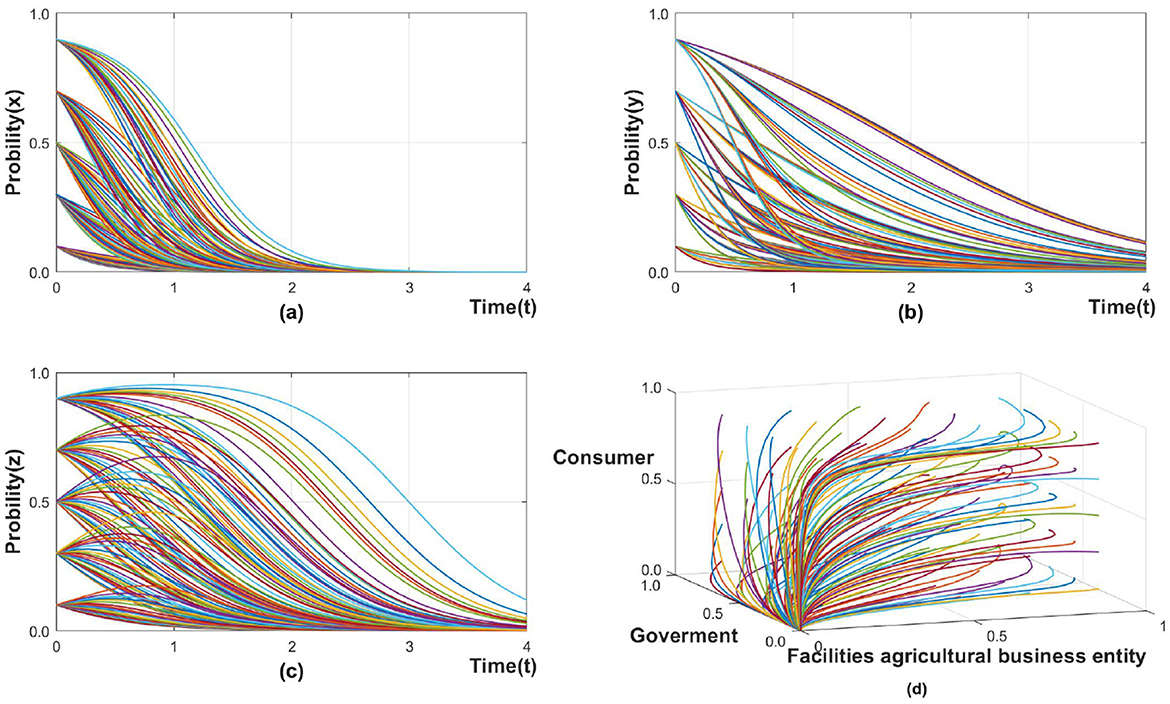
Figure 3. Evolution simulation results of case 1. (a–c) represent the evolution simulation results of facilities agricultural business entity, government, and consumer under case 1, respectively. (d) represents the evolution of the system's stable state under case 1.
Case 2: mSP + mR2 + αCg2 + Ca1 < R1 + Ca2, and Cg1 < L.
When the evolutionary system satisfies the above constraints, the system can achieve local stability. At this time, the parameters are assigned as follows: α = 0.7, Cg1 = 2, Cg2 = 3, Cg3 = 1, Cg4 = 1, Rg = 1, L = 4, S = 10, P = 0.012, Ca1 = 2, Ca2 = 6, R1 = 1.3, R2 = 2, R5 = 1, m = 0.7, R3 = 2, R4 = 3, C = 1.5, and the results are shown in Figure 4 below . The evolutionary stability strategy is that the main body of facility agriculture does not choose digital greenhouses, the government supports the main body of facility agriculture to choose digital greenhouses, and consumers take a wait-and-see attitude toward the products of digital greenhouses. At this time, the government adopts a series of measures to encourage and support the main body of facility agriculture to carry out digital transformation of traditional greenhouses and gradually introduce digital greenhouses. At this time, the main body of facility agriculture may not choose to carry out digital transformation due to problems such as imbalanced cost and benefits, and consumers cannot choose to buy high-quality agricultural products.
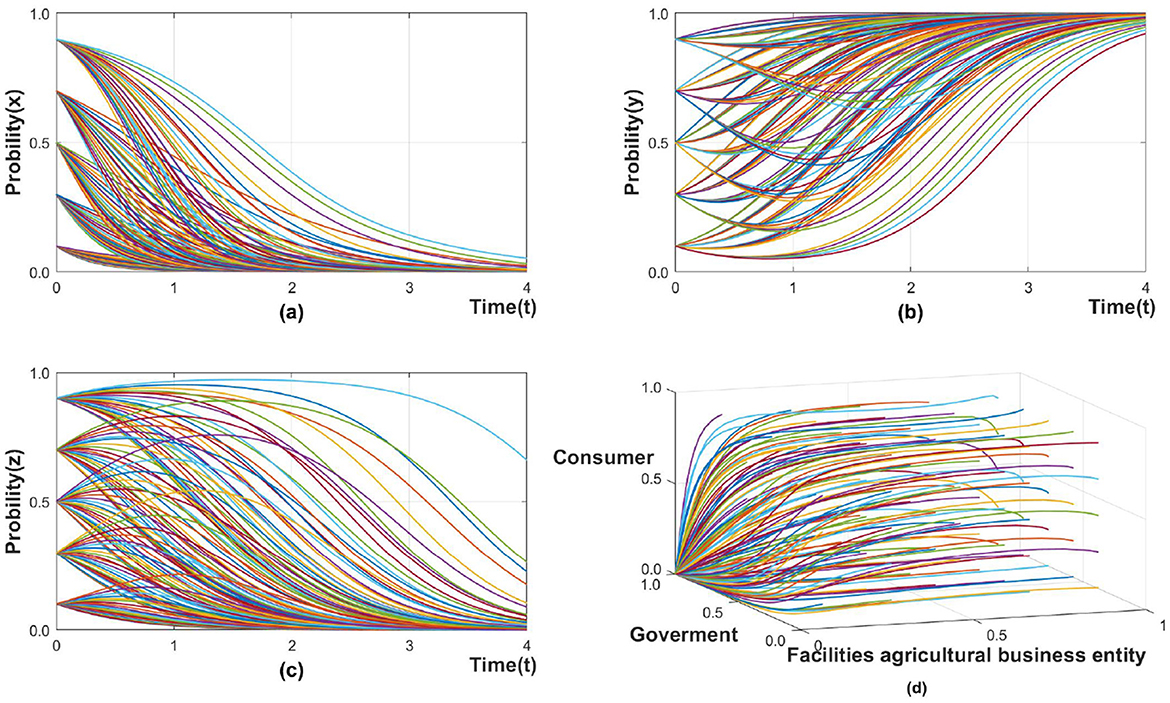
Figure 4. Evolution simulation results of case 2. (a–c) represent the evolution simulation results of facilities agricultural business entity, government, and consumer under case 2, respectively. (d) represents the evolution of the system's stable state under case 2.
Case 3: R1 + Ca2 < mSP + mR2 + R5 + Ca1, andL < Cg2 + Cg4 + Cg1.
When the evolutionary system satisfies the above constraints, the system can achieve local stability. At this time, the parameters are assigned as follows: α = 0.7, Cg1 = 1, Cg2 = 3, Cg3 = 1, Cg4 = 1, Rg = 1, L = 4, S = 10, P = 0.012, Ca1 = 6, Ca2 = 4, R1 = 1.3, R2 = 2, R5 = 1, m = 0.7, R3 = 2, R4 = 3, C = 1.5, and the results are shown in Figure 5. The evolutionary stability strategy is that the facility agriculture entity chooses digital greenhouses, the government does not support the facility agriculture business entity to choose digital greenhouses, and consumers actively purchase products from digital greenhouses. At this time, the facility agriculture business entity realizes that it is necessary to digitally transform the traditional greenhouses and gradually introduce digital greenhouses. At this time, the government does not provide any support to the facility agriculture business entity due to its own cost issues. Consumers pursue high-quality life and choose to buy high-quality products from digital greenhouses to improve their quality of life.
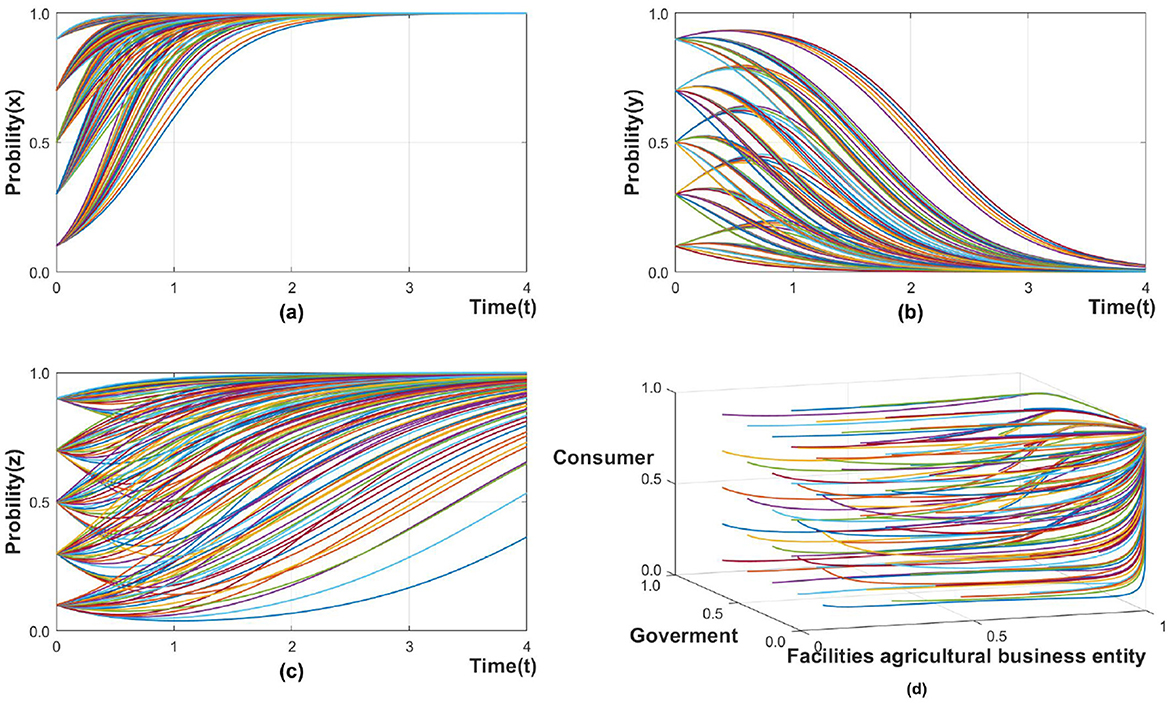
Figure 5. Evolution simulation results of case 3. (a–c) represent the evolution simulation results of facilities agricultural business entity, government, and consumer under case 3, respectively. (d) represents the evolution of the system's stable state under case 3.
Case 4: R1 + Ca2 < mSP + mR2 + αCg2 + R5 + Ca1, andCg2 + Cg4 + Cg1 < L.
When the evolutionary system satisfies the above constraints, the system can achieve local stability. At this time, the parameters are assigned as follows: α = 0.7, Cg1 = 2, Cg2 = 3, Cg3 = 1, Cg4 = 1, Rg = 1, L = 7, S = 10, P = 0.012, Ca1 = 4, Ca2 = 4, R1 = 1.3, R2 = 2, R5 = 1, m = 0.7, R3 = 2, R4 = 3, C = 1.5, and the results are shown in Figure 6 below . The evolutionary stability strategy is that the facility agriculture operator chooses digital greenhouses, the government supports the facility agriculture operator to choose digital greenhouses, and consumers actively purchase products from digital greenhouses. At this time, the government provides relevant support for the digital greenhouses of facility agriculture operating entities, provides relevant subsidies to reduce costs, and helps facility agriculture operating entities to transform traditional agricultural greenhouses more quickly and conveniently, enhance consumers' confidence in agricultural products, and increase sales.
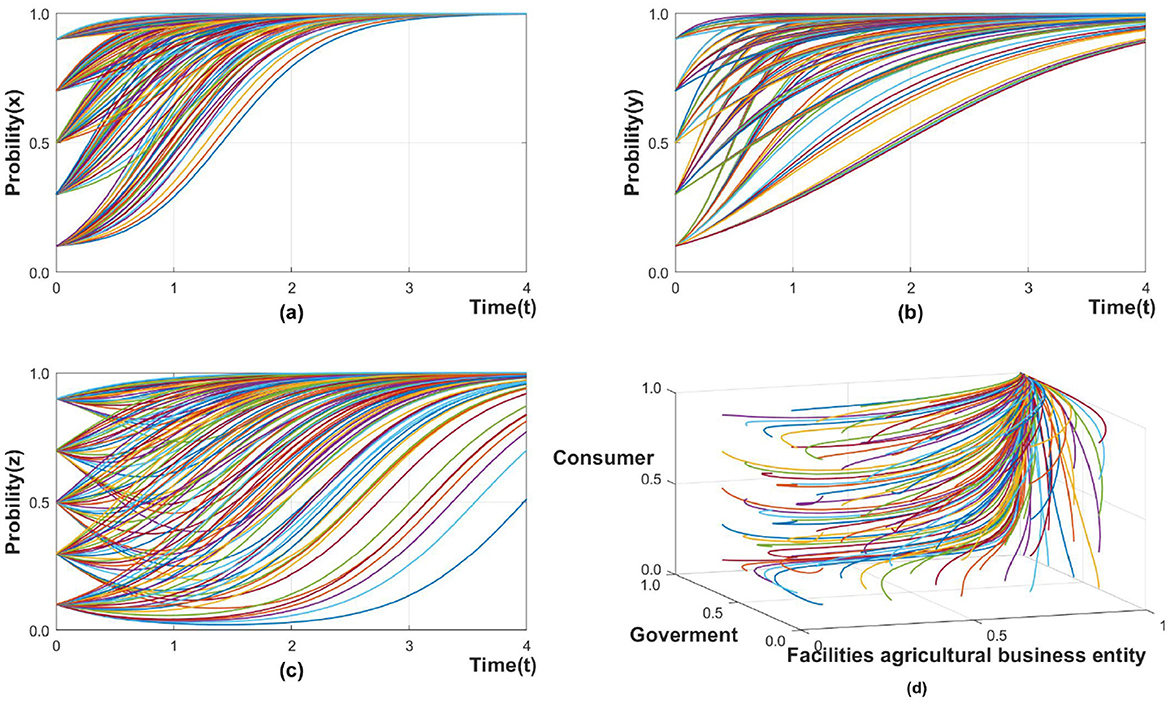
Figure 6. Evolution simulation results of case 4. (a–c) represent the evolution simulation results of facilities agricultural business entity, government, and consumer under case 4, respectively. (d) represents the evolution of the system's stable state under case 4.
4 Simulation analysis
Xianju County, Taizhou City, Zhejiang Province is known as the “Hometown of Chinese Bayberry.” In 2023, there are 145,000 mu of bayberry in Xianju County, with an output of 120,000 tons and a fresh fruit output value of 1.12 billion yuan, which will increase the average income of bayberry farmers by 35,200 yuan and the output value of the entire industry chain by 4 billion yuan. Zhejiang Province has specially introduced a subsidy policy for the construction of smart greenhouses in the provincial regional coordination funds, implemented 60 million fiscal funds, and subsidized 30,000 yuan per mu to promote the intelligent greenhouses of bayberry. It is planned to promote 2,000 mu of intelligent greenhouses of bayberry within 3 years from 2023. According to the survey results, as of 2023, Xianju County currently has more than 1,500 mu of intelligent greenhouse bayberry, with an output of about 1,600 tons and an output value of more than 141 million yuan, and the average output value per mu is 6 times that of open-air bayberry. According to statistics from the Zhejiang Provincial Taxation Bureau of the State Administration of Taxation, in 2023, local villagers will receive an average income of 10,800 yuan per person from bayberry alone, an increase of 11% year-on-year. In order to promote the development of facility agriculture, the Provincial Department of Agriculture and Rural Affairs and the Provincial Department of Finance of Zhejiang Province issued the “Implementation Rules for Subsidies (Assistance) for the Construction of Agricultural Facility Greenhouses in Zhejiang Province” and the “Implementation Rules for Subsidies for the Construction of Modern Agricultural Service Centers in Zhejiang Province.” Relevant regions have issued relevant policies on financial support for the construction of agricultural facility greenhouses based on actual conditions. In principle, the proportion of financial subsidies at all levels shall not exceed 50% of the total investment, and the subsidy for a single project shall not exceed 5 million yuan. Secondly, the maintenance and upkeep of greenhouses is the basis for ensuring their normal operation. Regular cleaning and pest control of equipment can extend the service life of greenhouses. When the facilities are aging or there are some problems that affect production, the equipment maintenance and replacement are carried out. The resulting maintenance cost is about 5,000 yuan. Among them, the annual labor cost is between 10,000 and 30,000 yuan. To facilitate subsequent analysis, the assignment of the above parameters has been simplified. Based on the typical scenario of the stable point (1,1,1), that is, the digital transformation of the facility agricultural business entity, the government's choice of support strategy, and consumers' purchase of high-quality agricultural products, the logical framework diagram of the digital transformation path of the facility agricultural business entity is constructed, as shown in Figure 7, and further numerical simulation is performed using MATLAB software. The initial values of the model parameters are set as: α = 0.7, Cg1 = 2, Cg2 = 3, Cg3 = 1, Cg4 = 1, Rg = 1, L = 7, S = 10, P = 0.012, Ca1 = 2, Ca2 = 4, R1 = 1.3, R2 = 2, R5 = 1, m = 0.7, R3 = 2, R4 = 3, C = 1.5.
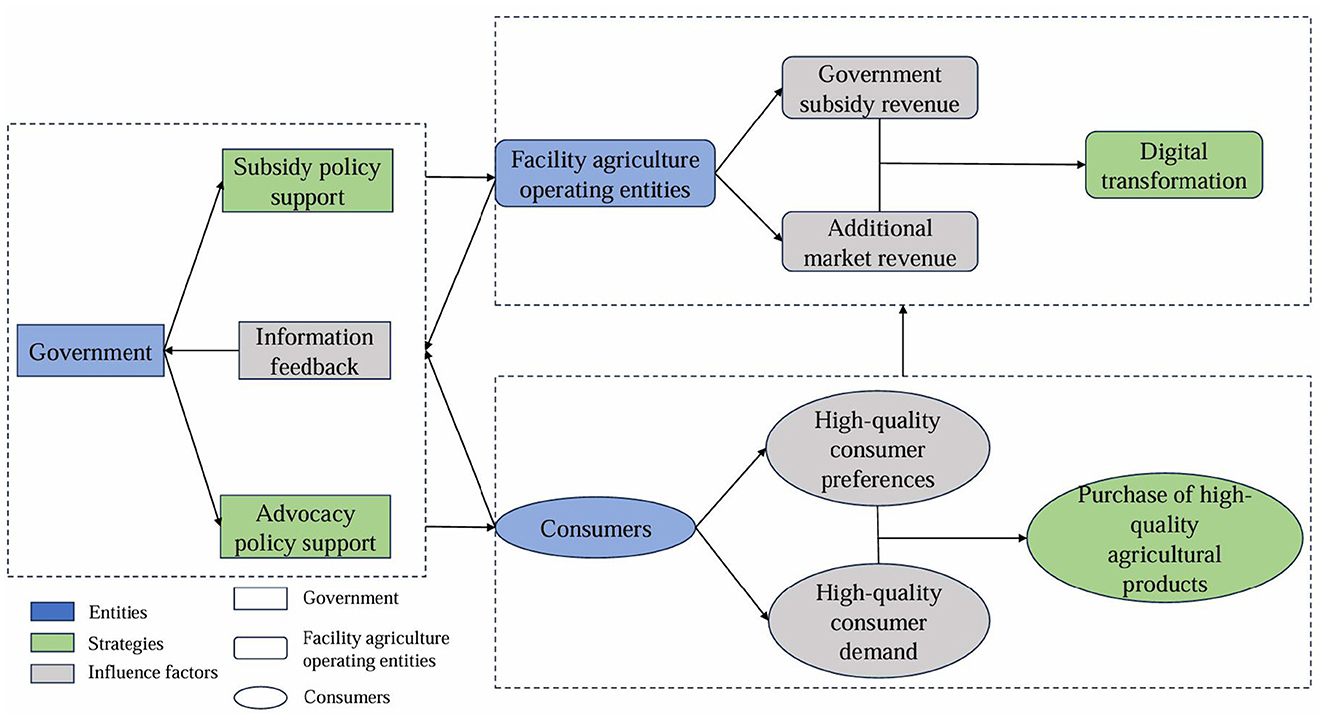
Figure 7. Logical framework diagram of digital transformation of facility agriculture operating entities.
4.1 Digital transformation of facility agriculture under the context of government subsidies
4.1.1 Government subsidies
Based on the initial government subsidy parameter assignment, this paper performs a scaling of [−50%, 50%], that is, 0, 1.5, 3, 4.5, 6, keeping other variables unchanged. The simulation results are shown in Figure 8 below. Figures (a), (b), and (c), respectively, represent the degree of influence of government subsidies on the strategies of facility agriculture operating entities, government and consumers. The simulation results show that when the government subsidy is < 3, the operator will not choose digital greenhouses, and consumers will not be able to buy high-quality products. However, as the government subsidy increases, the operator will choose digital greenhouses, and consumers will also actively buy high-quality products. For the government, when the government subsidy is < 4.5, the government will support the operator to choose digitalization, but when the government subsidy is >4.5, the government strategy will change from support to non-support as the evolution proceeds. However, when the government subsidy is 6, both the facility agriculture operator and the government are in an unstable state, which shows that the instability of the government subsidy decision also leads to the instability of the facility agriculture operator, and the consumer strategy is also slightly affected.

Figure 8. The impact of government subsidies on the system. (a–c) represent the impact of government subsidies on facilities agricultural business entity, government, and consumer, respectively.
Theoretically, government subsidies to business entities should have more benefits than disadvantages, but according to the evolutionary results, there are differences. When the government chooses a subsidy strategy, due to the small initial subsidy level, considering their own economic capabilities and risk tolerance, facility agriculture business entities will not choose digital greenhouses. When government subsidies increase, the cost that facility agriculture business entities need to pay is reduced, which alleviates the economic pressure of facility agriculture business entities. Related technical training also enhances the confidence and acceptance of facility agriculture business entities in digital greenhouses, making them more inclined to choose digital greenhouses. For the government, too much subsidy has caused certain cost pressure on itself (Fredriksson and Svensson, 2003), and may also cause business entities to develop a dependent mentality, gradually weakening their enthusiasm and initiative in business management, making government strategies unstable.
4.1.2 Government propaganda
Based on the initial government propaganda parameter assignment, this paper performs a scaling of [−50%, 50%], that is, 0, 1, 2, 3, 4, keeping other variables unchanged. The simulation results are shown in Figure 9 below. Figures (a), (b), and (c), respectively, represent the degree of influence of government subsidies on the strategies of facility agriculture operating entities, government and consumers. The simulation results show that when government propaganda is < 4, facility agriculture operating entities always choose digital greenhouses, the government always chooses a support strategy, and consumers also actively purchase. When the government subsidy is 4, the government propaganda strategy becomes unstable, the strategy affecting the facility agriculture operator is also unstable, and the impact on consumers is small.

Figure 9. The impact of government propaganda on the system. (a–c) represent the impact of government propaganda on facilities agricultural business entity, government, and consumer, respectively.
In terms of the current development of China's agriculture, most agricultural operators have a low level of education and limited ability to accept new things. It is difficult for government propaganda to be effective, and operators need some time to accept it. The government, through persistent propaganda and correct policy guidance, can increase the popularity of digitalization, increase the recognition of digitalization by agricultural operators, and provide strong policy support and practical help for the digital transformation of facility agriculture. However, the government needs to spend time and manpower to promote digitalization, which costs the government a certain amount, leading to a change in the government's strategy in the overall decision-making process.
4.1.3 Digital literacy
This paper assigns the perceived benefits of facility agriculture operating entities choosing digitalization to 0, 0.25, 0.5, 0.75, and 1, indicating that the digital literacy of facility agriculture operating entities is 0, 25%, 50%, 75%, 100%, keeping other variables unchanged, the simulation results are shown in Figure 10 below. Figures (a), (b), and (c), respectively, represent the degree of influence of government subsidies on the strategies of facility agriculture operating entities, government and consumers. The simulation results show that when the perceived benefits of facility agriculture operating entities are < 0.25, facility agriculture operating entities will not choose digitalization, but as the digital literacy of facility agriculture operating entities increases, the perceived benefits of digitalization increase, and facility agriculture operating entities will change their strategies and choose digital transformation, and as the perceived benefits increase, the evolution rate accelerates. For the government, the government improves the digital literacy of operators through continuous publicity, reduces the perceived risks of digital transformation, and increases perceived benefits. Therefore, the government has always supported operators to choose digital greenhouses. For consumers, if facility agriculture operating entities do not choose digital greenhouses, they will not be able to buy high-quality agricultural products. Therefore, the strategic choices of consumers are closely related to the strategic choices of facility agriculture operating entities.

Figure 10. The impact of perceived benefits on the system. (a–c) represent the impact of perceived benefits on facilities agricultural business entity, government, and consumer, respectively.
The greater the perceived benefit, the smaller the perceived risk, indicating that the better the expectations of the business entity after choosing digital facilities, the more inclined it is to choose digitalization. Perceived benefits are also a relatively subjective factor. The level of perceived benefits mainly depends on the sensitivity of the business entity in digitalization and whether it can choose digitalization accurately and timely at the right opportunity. For the government, the impact of digital literacy on itself is relatively small, but the government also hopes to improve the digital literacy of business entities through measures such as government publicity. When consumers choose agricultural products, they will comprehensively consider multiple factors such as price, quality, and brand reputation, and make purchasing decisions based on the market and their own needs. Therefore, consumer strategies are closely related to the strategic choices of facility agriculture operating entities.
4.2 Digital transformation of facility agriculture without government subsidies
According to the above analysis, the government can accelerate the digital transformation of facility agriculture operating entities by increasing subsidies, but government subsidies require the government to invest a lot of costs, which will bring financial pressure to the government. Therefore, in order to further explore the development of digital transformation of facility agriculture operating entities, this section adjusts government subsidies to zero, and further discusses the impact of changes in digital literacy of facility agriculture operating entities on the strategies of each entity without government subsidies.
With the widespread promotion of facility agriculture, the digital literacy of facility agriculture operating entities will inevitably be improved. Therefore, this paper assigns digital literacy to 0, 1, 2, 3, and 4, keeping other variables unchanged. The simulation results are shown in Figure 11 below. Figures (a), (b), and (c), respectively, represent the degree of change in the strategies of facility agriculture operating entities, government, and consumers. The simulation results show that compared with government subsidies, facility agriculture operating entities need to bear greater economic pressure, so they need to have higher digital literacy to achieve digital transformation. When the government subsidy is zero, digital transformation can only be achieved when the digital literacy of facility agriculture operating entities is >2. Therefore, the digital literacy of facility agriculture operating entities is the key to the digital transformation of facility agriculture. By improving the digital literacy of facility agriculture operating entities, we can promote intelligent agricultural management, improve production efficiency, enhance brand competitiveness, and provide a strong guarantee for the healthy development of facility agriculture.

Figure 11. The impact of digital literacy on the system without government subsidies. (a–c) represent the impact of digital literacy on facilities agricultural business entity, government, and consumer, respectively.
5 Conclusion and policy recommendations
In the process of achieving high-quality agricultural development, facility agriculture is accelerating its transformation to digitalization. In order to further improve the popularization and application of digital greenhouses in facility agriculture, this paper constructs a three-party game model among facility agriculture operating entities, the government, and consumers, and combines numerical simulation to explain the evolution of the three-party game strategy, and discusses the impact of different parameters on the game results. The study found that:
(1) The optimal value of government subsidies should be between 3 and 4.5. When the government subsidy is < 3, the main operators of facility agriculture will refuse to transform due to financial pressures such as economic costs. When the subsidy is higher than 4.5, the unstable state of government subsidy decision-making leads to the unstable transformation decision-making of the main operators of facility agriculture.
(2) When government publicity is < 4, the main operators of facility agriculture will carry out digital transformation of traditional greenhouses. However, the higher the government publicity, the greater the cost pressure, which leads to instability in government publicity decisions, which in turn affects the decision-making of facility agriculture operating entities.
(3) The higher the digital literacy of the facility agriculture operating entities, the more inclined they are to digitalize facility agriculture, and the faster the transformation. However, no matter what level of digital literacy the facility agriculture operating entities have achieved, the government always chooses to support policies.
(4) In the absence of government subsidies, only when the digital literacy of facility agriculture operating entities is >2 will they be able to bear the risks brought about by the digitalization of facility agriculture and actively choose digital transformation.
Based on the above conclusions, the following countermeasures and suggestions are put forward:
First, formulate a stable and effective government subsidy policy. First, according to the actual needs of the digitalization of facility agriculture, clearly define the scope and method of subsidies to improve agricultural production efficiency. The subsidy method adopts direct subsidies and indirect subsidies. Direct subsidies are directly issued to qualified facility agriculture operating entities. Indirect subsidies can reduce the financial costs of facility agriculture operating entities through tax incentives, loan interest subsidies and other methods. Secondly, different types of subsidy projects should formulate different standards, and differentiated subsidies should be provided according to factors such as region, scale, and technical level to ensure the fairness and effectiveness of subsidies. After the implementation of the subsidy policy, it is necessary to strengthen the follow-up investigation of the use of subsidy funds to ensure that the subsidy funds are used for their intended purposes, and to maximize the benefits of the use of subsidy funds, so as to provide strong support for the digitalization of facility agriculture.
Second, strengthen the publicity and implementation of government policies. In the process of promoting the digitalization of facility agriculture, the government should make full use of new media platforms, widely publicize the relevant policies, subsidy measures and successful transformation cases of facility agriculture digitalization, carry out more face-to-face policy Q&A activities, and enhance the transparency and credibility of policies. The government needs to establish and improve the policy implementation supervision mechanism, evaluate the implementation of policies, and ensure that the policies are truly implemented and effective. At the same time, set up complaint reporting channels to encourage facility agriculture operating entities to actively feedback problems and correct deviations in a timely manner.
Third, improve the digital literacy of facility agriculture operating entities. In response to the actual needs of facility agriculture operating entities, organize and carry out relevant digital knowledge and skills training, cultivate high-quality and professional digital talents, make full use of the Internet platform, cultivate the digital thinking and innovation capabilities of facility agriculture operating entities, improve their digital skills, promote the development of facility agriculture in the direction of intelligence and precision, and achieve sustainable development of agricultural production.
Fourth, build a comprehensive digital system for facility agriculture. In the process of digitalization of facility agriculture, the main operators of facility agriculture must strengthen infrastructure construction, widely use sensors, smart irrigation and other Internet of Things equipment, and establish a big data processing and analysis platform when necessary to achieve real-time monitoring and regulation of the agricultural production environment and provide support for their own decision-making. Facility agriculture operating entities also need to pay attention to the digital skills training of employees in order to provide support for the construction and operation of the comprehensive digital system. At the same time, actively seek policy support and financial support from relevant government departments to reduce the costs and risks of facility agriculture operating entities in the process of digital transformation.
It should be noted that this paper has certain limitations. For example, this paper simplifies the decision-making of each participant in the game model to a certain extent, and also simplifies the assignment of relevant parameters, ignoring other complex cost-benefit relationships that may exist between the three parties. This needs to be further supplemented in subsequent research.
Data availability statement
The raw data supporting the conclusions of this article will be made available by the authors, without undue reservation.
Author contributions
XD: Formal analysis, Investigation, Software, Validation, Writing – original draft. YZ: Funding acquisition, Methodology, Resources, Supervision, Validation, Writing – original draft. DY: Conceptualization, Data curation, Investigation, Supervision, Visualization, Writing – review & editing.
Funding
The author(s) declare that financial support was received for the research and/or publication of this article. This study was supported by the National Social Science Foundation of China (No. 21CJY049).
Conflict of interest
The authors declare that the research was conducted in the absence of any commercial or financial relationships that could be construed as a potential conflict of interest.
Generative AI statement
The author(s) declare that no Gen AI was used in the creation of this manuscript.
Publisher's note
All claims expressed in this article are solely those of the authors and do not necessarily represent those of their affiliated organizations, or those of the publisher, the editors and the reviewers. Any product that may be evaluated in this article, or claim that may be made by its manufacturer, is not guaranteed or endorsed by the publisher.
Footnotes
1. ^Data source: National Modern Facility Agriculture Construction Plan (2023-2030).
References
Alalawi, Z., and Zeng, Y. (2020). Toward understanding the interplay between public and private healthcare providers and patients: an agent-based simulation approach. EAI Endorsed Trans. Indus. Netw. Intell. Syst. 7:166668. doi: 10.4108/eai.21-10-2020.166668
Balabanova, N., Bashir, A., Bova, P., Buscemi, A., Cimpeanu, T., da Fonseca, H. C., et al. (2025). Media and responsible AI governance: a game-theoretic and LLM analysis. arXiv [preprint] arXiv:2503, 09858.
Barrett, S. (2016). Coordination vs. voluntarism and enforcement in sustaining international environmental cooperation. Proc. Natl. Acad. Sci. U. S. A. 113, 14515–14522. doi: 10.1073/pnas.1604989113
Blom, T., Jenkins, A., Pulselli, R. M., and van den Dobbelsteen, A. A. J. F. (2022). The embodied carbon emissions of lettuce production in vertical farming, greenhouse horticulture, and open-field farming in the Netherlands. J. Clean. Prod. 377:134443. doi: 10.1016/j.jclepro.2022.134443
Bova, P., and Di Stefano, A. (2024). Both eyes open: vigilant Incentives help auditors improve AI safety. J. Phys. Complex. 5:025009. doi: 10.1088/2632-072X/ad424c
Camanzi, L., Polino, M., and Verza, M. (2020). Market structure and supply chain strategies in the global agricultural commodity industry: a comparison between EU and USA. J. Glob. Bus. Adv. 13:110620. doi: 10.1504/JGBA.2020.110620
Chappin, M. M. H., Punt, M. J., Toxopeus, H. S., van Tilburg, N., de Jongh, C. L., Runhaar, H. A. C., et al. (2024). How can networks address barriers to nature-based solutions? The case of agriculture and construction in the Netherlands. Landsc. Urban Plann. 251:105147. doi: 10.1016/j.landurbplan.2024.105147
Chen, Y., Wang, Z., You, K., Zhu, C., Wang, K., Gan, M., et al. (2024). Trends, drivers, and land use strategies for facility agricultural land during the agricultural modernization process: evidence from Huzhou City, China. Land 13:543. doi: 10.3390/land13040543
Encarnação, S., Santos, F. P., Santos, F. C., Blass, V., Pacheco, J. M., Portugali, J., et al. (2016). Paradigm shifts and the interplay between state, business and civil sectors. R. Soc. Open Sci. 3:160753. doi: 10.1098/rsos.160753
Fredriksson, P. G., and Svensson, J. (2003). Political instability, corruption and policy formation: the case of environmental policy. J. Public Econ. 87, 1383–1405. doi: 10.1016/S0047-2727(02)00036-1
Han, T. A., Traulsen, A., and Gokhale, C. S. (2012). (2012). On equilibrium properties of evolutionary multi-player games with random payoff matrices. Theoret. Popul. Biol. 81, 264–272. doi: 10.1016/j.tpb.2012.02.004
Heyl, K., Ekardt, F., Sund, L., and Roos, P. (2022). Potentials and limitations of subsidies in sustainability governance: the example of agriculture. Sustainability 14:15859. doi: 10.3390/su142315859
Hofbauer, J., and Sigmund, K. (1998). Evolutionary Games and Population Dynamics. Cambridge: Cambridge University Press. doi: 10.1017/CBO9781139173179
Huimin, X., Xiuli, W., Ling, L., and Xia, S. (2020). Evaluation and optimization of facility agriculture development potential in Henan Province. Jiangsu Agric. Sci. 48, 286–293. doi: 10.15889/j.issn.1002-1302.2020.04.052
Jiabin, Y., Xiao, L., Xiaoping, Y., and Jinpeng, J. (2021). Agricultural digital transformation from the perspective of innovation ecosystem theory: driving factors, strategic framework and realization path. Issues Agric. Econ. 101–116. doi: 10.13246/j.cnki.iae.20210603.002
Jian, L. (2024). Digital infrastructure construction and Chinese agricultural and rural modernization: based on the mediating effect of rural industrial diversification development and digital literacy. Econ. Surv. 41, 28–41. doi: 10.15931/j.cnki.1006-1096.2024.03.011
Jiangyi, L., and Fan, Q. (2022). How to overcome the demand dilemma of farmland transfer in China? Evidence from the development of new agricultural operators. J. Manag. World 38, 84–99+86. doi: 10.19744/j.cnki.11-1235/f.2022.0025
Junhu, R., Tianjun, L., Xiaochun, F., Zhiwei, Q., Xuexi, H., Yuchun, Z., et al. (2020). Digital agriculture operation and management: key issues, methodology and demonstration project. J. Manag. World 36, 222–233. doi: 10.19744/j.cnki.11-1235/f.2020.0130
Kahneman, D., and Tversky, A. (2013). “Prospect theory: an analysis of decision under risk,” in Handbook of the Fundamentals of Financial Decision Making: Part I (Singapore: World Scientific Publishing), 99–127. doi: 10.1142/9789814417358_0006
Lassoued, R., Phillips, P. W. B., and Smyth, S. J. (2023). Exploratory analysis on drivers and barriers to Canadian prairie agricultural technology innovation and adoption. Smart Agric. Technol. 5:100257. doi: 10.1016/j.atech.2023.100257
Lee, C-, C., He, Z-, W., and Yuan, Z. (2023). A pathway to sustainable development: digitization and green productivity. Energy Econ. 124:106772. doi: 10.1016/j.eneco.2023.106772
Li, X., Zhang, X., and Jin, X. (2024). Spatio-temporal characteristics and driving factors of cultivated land change in various agricultural regions of China: a detailed analysis based on county-level data. Ecol. Indic. 166:112485. doi: 10.1016/j.ecolind.2024.112485
Liu, J., Yu, J., Yin, Y., and Wei, Q. (2021). (2021). An evolutionary game approach for private sectors' behavioral strategies in China's green energy public–private partnership projects. Energy Rep. 7:696–715. doi: 10.1016/j.egyr.2021.09.201
Liu, Q. (2015). Experience and reference of the development of foreign facilities agriculture. World Agric. 143–146. doi: 10.13856/j.cn11-1097/s.2015.08.029
Lubberhuizen, C. (2024). Follow the commutes: the viapolitics of commuting within infrastructures of agricultural labour migration in The Netherlands and Belgium. Mobilities 19, 990–1005. doi: 10.1080/17450101.2024.2336100
McConnell, A., and Hart, P. (2019). Inaction and public policy: understanding why policymakers ‘do nothing'. Policy Sci. 52, 645–661. doi: 10.1007/s11077-019-09362-2
Ogbo, N. B., Elragig, A., and Han, T. A. (2022). Evolution of coordination in pairwise and multi-player interactions via prior commitments. Adapt. Behav. 30, 257–277. doi: 10.1177/1059712321993166
Ohtsuki, H., and Nowak, M. A. (2008). (2008). Evolutionary stability on graphs. J. Theoret. Biol. 251, 698–707. doi: 10.1016/j.jtbi.2008.01.005
Peng-bo, R., Tian-jie, S., Yan-hua, W., Rui-yuan, W., Xin-qi, X., and Ge-juan, F. (2024). Enrichment status and risk assessment of heavy metals and microplastics in soils from facility-based vegetable bases. Environ. Sci. 1–16. doi: 10.13227/j.hjkx.202404083
Qing, Y., Jiefei, J., Jin, L., and Qing, X. (2023). How does the subsidy to the purchase of agricultural machinery andtools affect the overall grain production capacity? Based on theperspective of socialization services of agricultural machinery. J. Manag. World 39, 106–123. doi: 10.19744/j.cnki.11-1235/f.2023.0147
Saleem, H., Li, Y., Ali, Z., Ayyoub, M., Wang, Y., Mehreen, A., et al. (2021). Big data use and its outcomes in supply chain context: the roles of information sharing and technological innovation. J. Enterpr. Inform. Manag. 34, 1121–1143. doi: 10.1108/JEIM-03-2020-0119
Sasaki, T., Okada, I., Uchida, S., and Chen, X. (2015). Commitment to cooperation and peer punishment: its evolution. Games 6, 574–587. doi: 10.3390/g6040574
Selten, R., and Selten, R. (1988). A Note on Evolutionarily Stable Strategies in Asymmetric Animal Conflicts. Springer. doi: 10.1007/978-94-015-7774-8_3
Shirong, G., Jin, S., Sheng, S., and Jing, L. (2012). General situations, charactics and trends of protected horticulture in foreigns. J. Nanjing Agric. Univ. 35, 43–52.
Shuzhong, M., Ge, H., and Jiwen, G. (2022). The welfare effect of digital agriculture: deconstruction from the perspective of value recreation and value redistribution. Issues Agric. Econ. 10–26. doi: 10.13246/j.cnki.iae.2022.05.006
Smith, J., and Price, G. R. (1973). The logic of animal conflict. Nature 246, 15–18. doi: 10.1038/246015a0
Wei-jiang, L., and Bing-qi, L. (2024). Paths of rural digital infrastructure construction empowering rural revitalization—based on the perspective of the industrial integration of digitization and modern agricultural industry. J. Shanxi Univ. Fin. Econ. 46, 72–88. doi: 10.13781/j.cnki.1007-9556.2024.10.006
Wei-ping, C., Jia, Z., Jia-wei, W., and Lei, Z. (2024). Research on the impact of digital inclusive finance on the development of modern facility agriculture. Rural Fin. Res. 43–55. doi: 10.16127/j.cnki.issn1003-1812.2024.08.003
Xudong, H., Ruonan, W., Mengyi, C., and Fengtian, Z. (2020). (2020). An empirical analysis on the development status and influencing factors of facility agriculture of large-scale farmers. Resour. Sci. 42, 749–762. doi: 10.18402/resci.2020.04.13
Xue, Z., Baofeng, S., Qingen, G., Bi, W., and Minjuan, Z. (2023). Promoting revitalization through integration: the income increase effect of new type of agricultural operating entities participating in industrial integration. J. Manag. World 39, 86–100. doi: 10.19744/j.cnki.11-1235/f.2023.0071
Yamashita, R., Kidoguchi, K., Oshima, T., and Ishigaki, A. (2024). Sustainable paddy farming in rural Japan: leveraging farmer integration and agricultural UAVs for synergistic solutions. J. Clean. Prod. 475:143685. doi: 10.1016/j.jclepro.2024.143685
Yang, G., Shoupeng, W., and Ziming, H. (2023). Agricultural digitalization and the development of new agricultural operators. J. Zhongnan Univ. Econ. Law 108–121. doi: 10.19639/j.cnki.issn1003-5230.2023.0048
Yi, Z., and Jinjiang, Y. (2024). Innovative development of modern facilities agriculture: theoretical logic, real situation and reform path. Dongyue Tribune 45, 68–77. doi: 10.15981/j.cnki.dongyueluncong.2024.01.008
Zhen, Z., and Xueyu, L. (2015). The present situation and countermeasures of facility agriculture development in our country. Issues Agric. Econ. 36, 64–70+111. doi: 10.13246/j.cnki.iae.2015.05.008
Zhi-xin, T., and Yun-hua, Z. (2020). Supply and demand situation, policy implementation dilemma and optimization strategy of facility agricultural land. Reform 109–118.
Keywords: evolutionary game, facility agriculture, influencing factors, digital transformation, digital literacy
Citation: Dou X, Zheng Y and Yang D (2025) Promoting digital transformation in facility agriculture: the role of government policies and digital literacy. Front. Sustain. Food Syst. 9:1575666. doi: 10.3389/fsufs.2025.1575666
Received: 12 February 2025; Accepted: 17 June 2025;
Published: 11 July 2025.
Edited by:
Marzia Ingrassia, Università degli Studi di Palermo, ItalyReviewed by:
The Anh Han, Teesside University, United KingdomMario Alejandro Hernández Chontal, Universidad Veracruzana, Mexico
Copyright © 2025 Dou, Zheng and Yang. This is an open-access article distributed under the terms of the Creative Commons Attribution License (CC BY). The use, distribution or reproduction in other forums is permitted, provided the original author(s) and the copyright owner(s) are credited and that the original publication in this journal is cited, in accordance with accepted academic practice. No use, distribution or reproduction is permitted which does not comply with these terms.
*Correspondence: Di Yang, MTYwOTYwOTdAempjc3QuZWR1LmNu
 Xiaochen Dou1
Xiaochen Dou1 Yangyang Zheng
Yangyang Zheng Di Yang
Di Yang